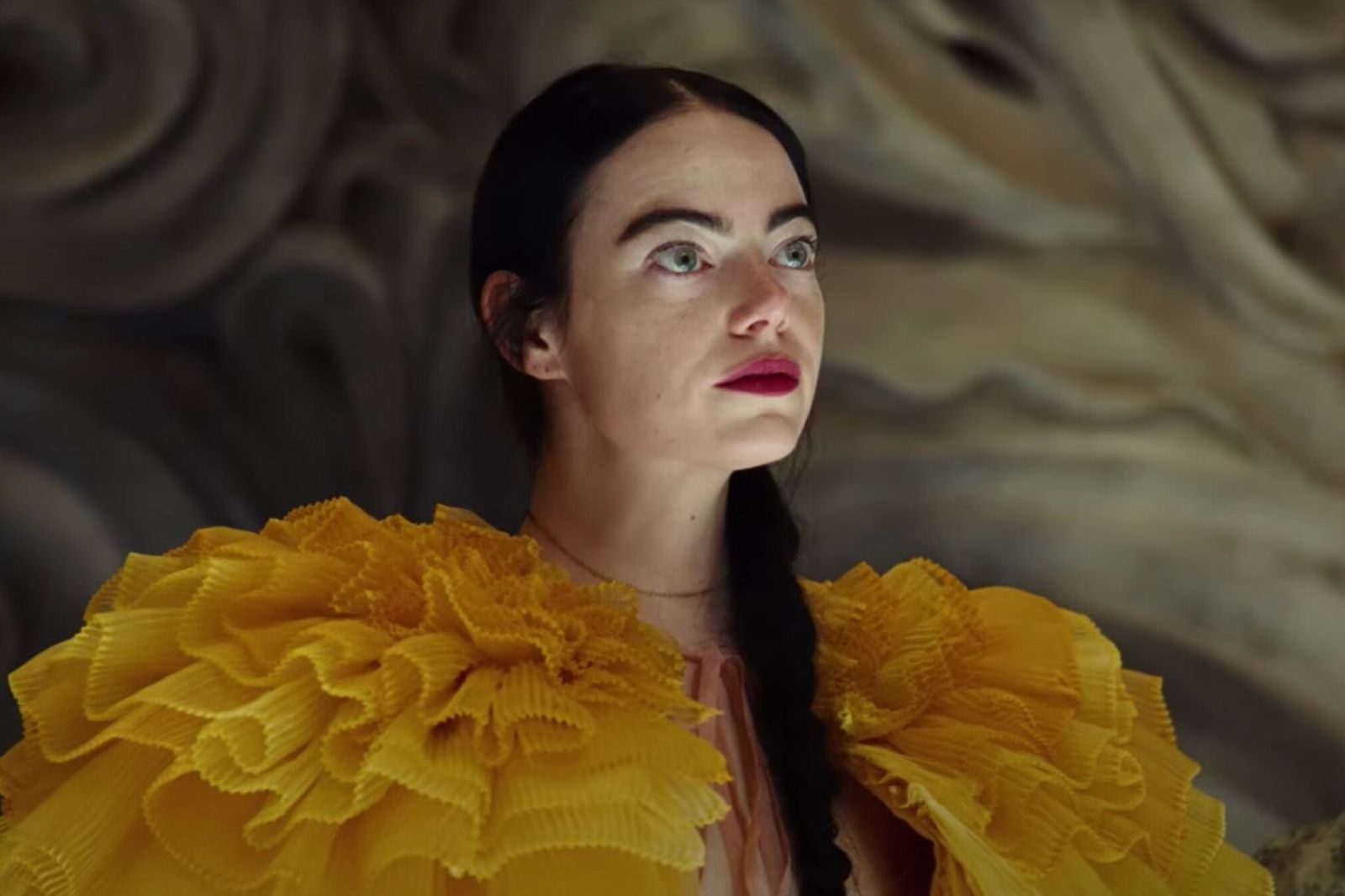As troubling as it is strikingly, giddily beautiful, Poor Things is a steampunk fairy tale with a deeply uncomfortable edge. Yorgos Lanthimos‘ adaptation of Alasdair Gray‘s take on the Frankenstein story features a spectacular, intensely physical performance from Emma Stone as a young woman brought into being by a mad scientist, who sets out to forge her own humanity through boundless curiosity and voracious sexual appetite.
Bella Baxter is the creation of the monstrous-looking surgeon Godwin Baxter (Willem Dafoe), who took delivery of a pregnant young woman who had recently drowned herself. Baxter took the brain of the unknown woman’s foetus and implanted it into her skull. The result is an adult woman with the tumbling, tottering gait, halting speech patterns, and spontaneous capriciousness of a toddler. Despite her childish nature – albeit with vastly accelerated development – she is whisked away on a series of crazy, often carnal adventures with disreputable lothario Duncan Wedderburn (Mark Ruffalo).
Lanthimos is revered for his absurdist, surreal view of the world, usually punctuated by awkward, mannered performance and jet black humour. His customary stylisation is in full effect here, with its frequent use of fish eye lenses, photography that switch from black and white to colour, and lush, outlandish, matte-painted backdrops. It’s a visual feast (lensed beautifully by Lanthimos’ frequent collaborator Robbie Ryan), with the fearless, committed Stone at its core. Her performance harks back to the weird, stilted physicality of Dogtooth, Lanthimos’ 2009 calling card. Poor Things also chimes thematically with that film. Both deal with unorthodox, abusive relations within family units. It’s done with a breezier, more whimsical touch than in Dogtooth, which arguably makes it more disturbing when its implications are considered.
Those who have seen Poor Things as a celebration of female sexuality are it risk of overlooking the tale’s dark elements of cycles of abuse – Godwin talks often of the experiments carried out on him by his father – and the value some men place on the idea of innocence. Perhaps the fairy tale elements mask this through fable; Bella seems immune from such things as menstruation, pregnancy, and venereal disease for example. Everything she goes through proves instructive but not dangerous, in stark contrast to they way similar themes are approached in Dogtooth. It’s so playful and strangely joyous in places that there’s a veneer of cheer – and some incredibly fun performances – to distract from its darker heart.
Among those performances is Dafoe’s misguided but generally kind and paternal Godwin. He’s as mad as mad scientists get, but is driven completely by scientific enquiry instead of malice. He’s a sympathetic figure, especially given how he details his treatment at the hands of his father, with no trace of bitterness. He’s both Frankenstein and monster in this tale, just as Bella is both mother and daughter – containing herself like a fucked up Matryoshka doll. Defoe’s enjoyably wobbly Scottish accent is also one of the few nods to the Glaswegian location of the source novel. Mark Ruffalo gives a rollicking comic turn as the acquisitive, priapic Wedderburn. No less driven by pure id than Bella, he ultimately proves the more childish, lacking the capability for growth that Bella demonstrates in spades. Ruffalo is all cocksman bravado and teeth-gnashing tantrums in a relaxed, loose-limbed performance, far away from the Marvel meatgrinder.
it would be surprising if Poor Things became as big a hit as Lanthimos’ previous film The Favourite. It’s too explicit, too weird, too meandering and picaresque for it to hit with the same general acclaim. Neither Lanthimos nor screenwriter Tony McNamara seem interested in reconciling the film’s presentation with the story’s more twisted implications, and it’s a reminder that above all else Lanthimos is an arch provocateur. That said, one suspects that Poor Things was only possible because of his previous film’s success. However a film so singular, brilliant, and thematically uneasy gets to the screen, it’s just delightful that it has. Possibly one of the most bizarre films to ever garner awards season buzz, it’s truly something to behold.
In cinemas nationwide from Fri 12 Jan 2024


Comments